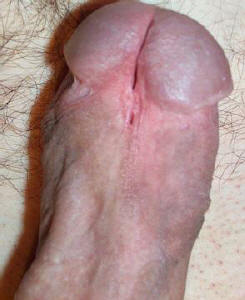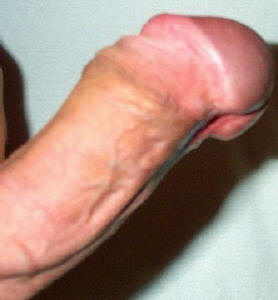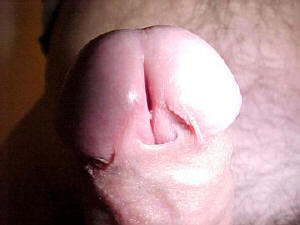|
|
|
Hypospadias? A twist of fate - your penis isn't like most of the othersOther articles you might wish to read: Newspaper article on hypospadias and another UK newspaper article on hypospadias and its impact I strongly recommend anyone with this problem to look at and join the relevant support groups (see links below) - you will learn you are not alone!
Hypospadias, which is an accident of birth, is a condition where the opening of a boy's penis is found somewhere back along the shaft, anywhere from tip to base. His penis often has other differences such as penile twisting, a "hooked" appearance because the glans bends down, and a hooded, incomplete foreskin. Hypospadias may not be that well known, but for the men who experience it, the consequences can be devastating, because it strikes at the root of "normality" - and, as I suggested on the penis size page, for most men, being up there with the rest of mankind is a crucial issue. What is hypospadias?Hypospadias is a developmental abnormality which causes some issues in the size and shape of the penis as it grows. The word abnormal is a horrible one, because the penis is such a variable organ anyway. You could see hypospadias as just another variation of normality - it's certainly common enough, affecting between one in a hundred and one in two hundred boys - and it's getting more common all the time. A boy with hypospadias may have a penis which is smaller than you'd expect for his age, though this is not the most common feature. His pee-hole, or urinary meatus to be a little more formal, may be located along the underneath of the glans or even further back along the shaft - in the most severe cases, it will be at the junction of the scrotum and penile shaft. When a boy has hypospadias, he also usually has a foreskin which hasn't formed correctly, covering only the top half of the glans like a hood. The foreskin may adhere to the glans, and the glans itself may be flattened, or shaped like a flat mushroom. And often the head of the penis bends downwards because of a condition known as chordee. In some cases, there is also rotation of the gland on the shaft: you can see that all these issues are developmental abnormalities. You can see pictures of hypospadias on this website: follow this link. Why does it happen?There are many suggestions, but no definitive answers to this question. What we do know is that during development of the male baby, it is crucial that testosterone is produced in his tissues at a certain stage in his growth, around 6 - 8 weeks after conception. If this isn't produced, or if his tissues are insensitive to it for some reason, then his physical sexual development will not be normal. In the mildest case, this will mean that the hypospadias takes the form of a slit on the underside of the glans or it will appear on the shaft just below the head of the penis. In the more extreme cases, it may lead to intersex conditions where the child is born with a mixture of male and female characteristics. What might cause this? The first possibility is that a boy has a genetic mutation which makes his body tissues insensitive to testosterone - a condition known as androgen insensitivity. There are a number of mutations which vary in severity and lead to varying degrees of androgen insensitivity - obviously, the greater the resistance to testosterone, the more obvious the difference from the norm. Besides being born with a slightly different penis, a boy with androgen insensitivity may show less development of male features at puberty than other boys, so it is important he gets the medical support he needs. These genetic mutations are carried on the X chromosome, which a boy inherits from his mother. This means that in some cases at least, an affected boy's father will not have hypospadias, although his mother's brothers may do so. The most extreme form of androgen insensitivity is a condition known as Testicular Feminization Syndrome, in which a baby has the male chromosome but its tissues are completely insensitive to testosterone, and it develops as a female, although lacking ovaries and womb. This is a very rare condition, affecting perhaps 1 in 65,000 male (as defined by chromosome structure) births. Second, some scientists have suggested that estrogens administered to the mother while the baby develops inside her can affect the process of male sexual development; this seems reasonable, since estrogens do prevent testosterone acting effectively on the cells of the male body. The problem we seem to be facing is that many chemicals used in the modern world mimic the effect of natural estrogens in the body. Some of the chemical responsible have been identified as plasticizers used in many plastic materials, some common pesticides, and pollutants produced by burning rubbish. And another source of environmental estrogenic compounds is the high levels of estrogens put into sewage systems through the use of the contraceptive pill. The truth is, it's a complex issue. But when there are other factors, like chromosomal abnormalities (Klinefelter's Syndrome is sometimes a suspect), they will generally leave enough clues for a diagnosis. It is in the simple cases of mild hypospadias that an explanation of what has happened may never be forthcoming. Of course, in medicine, when you start looking for factors that occur together, you can always find correlations between one thing and another. But this does not mean they are cause and effect. However, I feel I should include these observations, for the sake of completeness if nothing else. The March 2001 Journal of Urology reports a study in which older women seemed to have a higher risk of giving birth to baby boys with severe hypospadias. The risks are still very small, of course, but the findings showed that women 35 years of age and older had a 20% higher risk overall of having a baby with severe hypospadias. The researchers analyzed the incidence of hypospadias according to maternal age among women in New York State and California between 1983 and 1996. The investigators found that there were up to 3.1 cases of hypospadias per 1,000 births in women under 20 compared with up to 3.7 cases per 1,000 women over 35 or older. Dr Harry Fisch, one of the authors, stated: "Maternal age may be the single most important factor besides the genetic profile of the father and mother." Journal of Urology 2001. Volume165: pages 934-936. And to show just how complex this issue really is, another suggestion which has been made recently is that if the mother follows a vegetarian diet, her boy may be more likely to have hypospadias. My opinion is that there isn't enough evidence to suggest a clear connection at the moment. It is possible there is an intervening risk factor - for example, women may be drawn to vegetarian diets for some unknown physiological reason, and it may be this difference in physiology which causes the hypospadias, not the vegetarianism. One fact that needs to be more widely known is that a drug called Propecia, designed to reverse hair loss in balding men, can cause hypospadias if it is ingested by a pregnant woman. It works in balding men by inhibiting the conversion of testosterone to one of its more active derivatives, DHT, which is responsible in the fetus for the more important aspects of male physical development. Whatever the cause, we know the male reproductive system is a comparatively fragile one, and clearly its normal development can easily be disrupted. How does hypospadias develop?During the development of the male baby, two folds of tissue fuse together along the length of the penis to form the urethra. If the process of fusion stops before it reaches the tip of the penis, the urethra will open in the wrong place. When the fusion stops just below the tip of the penis, the urethra will open on the underside of the glans. If the fusion stops a bit sooner, the opening is located on the coronal ridge or just below it; this is called coronal hypospadias. These are the mildest forms of hypospadias, although they can still be accompanied by all the other aspects of the condition mentioned above, and sometimes the skin overlying the urethra is paper-thin for some distance back down the shaft. Sometimes the urethra may develop no further than the base of the penile shaft, in which case the head of the penis may be markedly bent downwards, because the groove in which the urethra would have developed is shorter than the penis itself. How often does hypospadias occur?Again, it's hard to say. I have seen estimates ranging from 1 in 100 to 1 in 1000 baby boys. What does seem clear, however, is that the frequency of hypospadias is increasing, alongside rising rates of infertility in men and decreased sperm quality. Scientists have suggested that some of these male reproductive anomalies have doubled over the past twenty-five years - and the finger of blame is being pointed at estrogens in the environment. The highest current estimate for the condition seems to be 1 in 100 births. (More data here.) What can be done about it? The current medical view is that if it is advisable surgery should be performed to correct the condition as soon as is possible - certainly within the first year or two after birth. 'Advisable' means that the hypospadias is severe, or the problems associated with it are disfiguring, or the urethral opening is in a position where the boy will have to sit down to pee - a devastating psychological problem, particularly at school - or the hypospadias induces frequent urinary tract infections. In the hands of a competent, experienced pediatric surgeon, the chance of a good result from surgery are high, although in a small minority of cases there are complications such as urinary tract fistulae (a hole opening up on the penile shaft) and scarring, which have to be operated on again. If the hypospadic penis is already small, as it sometimes is, this may ultimately reduce its size even further. In those cases where there is severe abnormality of sexual development, the Intersex Society of North America have made it clear that they support leaving surgery until the person concerned can decide for themselves what they want to do. Sure, most of these cases refer to gender identity, but even if one supports this view as an ideal, it leaves rather a lot of questions unanswered. At the very least, I'd hope that no caring parent or dedicated doctor would wish to leave a male child with severe hypospadias uncorrected. If the hypospadias is less severe, what to do? Many men I have met with uncorrected mild to moderate hypospadias are quite happy about it - some didn't even know they had a "problem"! Unfortunately an equal number of men who were not operated on are very upset about it, and see it as a betrayal by their parents. It's an incredibly difficult question - and there are few clear answers, for even taking the decision to operate is risky - surgery can fail, even nowadays with advanced techniques. What I would say is that a man who has uncorrected hypospadias and grows up exposed to shame because of the size or shape of his penis, or because he is laughed at by his peers, or because he has a sense of being 'different', can end up in adulthood with low self-esteem and no sexual self-confidence: the effect of these things on his ability to form intimate relationships can be a lot greater than the effect of the hypospadias itself. In other words: there are no certainties. Perhaps in the end the key is to find a doctor you trust - for parents of baby boys a pediatric urologist, and for older boys and men a urologist: make sure he has experience of the problem, and don't be afraid to question him or her. Any doctor who respects their patients will understand this attitude. And if they don't respect their patients, I would be reluctant to trust them. You may get more up to date information on surgery here: www.hypospadiasuk.co.uk What's the likely outcome of hypospadias? So much depends on the psychological issues. Some men face the most appalling difficulties and overcome them; some just don't find it as easy. The most inspiring man I met when I was writing this page had been born in the 1940's with no penis to speak of and only one testis. He was operated on when his father got back from the war and discovered the problems with his now five-year-old son's penis. The techniques of the time could only give him - as an adult - a penis that was about one inch long when flaccid and maybe one and a half inches long when erect, with one non-functional testis, so he was taking testosterone replacement therapy for life. He could stand to pee, but the operation had used hair-bearing tissue that meant he had to shave his reconstructed penis every week. He could orgasm, but not penetrate a partner, and he had no semen to ejaculate. Yet despite this he had established a successful career, married and lived comfortably with two adopted children. On the other hand, I have met men who have been almost unable to live with much less extreme difficulties. So how can one generalize? The answer seems to me that if a man is capable of sexual fulfillment, is reasonably happy, and can establish intimacy with a partner, he need not suffer unreasonably. But these are easy words to say. I have come across message boards on the internet with desperate pleas. One of them was from a 14 year old who clearly had no-one to confide in and felt alone with his problem. He had not been operated on, and his penis, he said, "was like a J," (curved down at the end in classic chordee), "I have to sit down to pee because it sprays everywhere, the foreskin won't fully go back, and I'm desperate because I'm too embarrassed to talk to anyone about it". Another was from a man who had had nine operations in adult life, ultimately unsuccessfully, to correct the condition. Although he now had a penis smaller in erection than when he started (due to the scar tissue), he said: "I am glad I tried because at least for a few months I felt normal while I could stand up to piss." And a third man wrote to me to say: "My hypospadias is a 'situation', not really a problem. No-one has ever actually told me anything about what happened to my penis. I only know that it is 'bent' and the urethra is at the join of the glans to the shaft, where the frenulum normally is. There appears to be scar tissue on the base of my penis and I have a non-functioning 'eye' where a urethra would normal discharge. As far as I can tell from self-examination, and a memory of a medical check done on my penis when I was about eight years old, my urethra was not satisfactorily formed before birth, and it may have been surgically corrected. Luckily the urethral meatus pees forwards and not downwards. The glans of my penis forms a sort of hood. I do not appear to have a frenulum and there is no foreskin on the underside of the penis, whilst the area at the base of the glans on the upper surface still has the remnant of a foreskin. I was born in 1956 in Sydney Australia. I am capable of urination and ejaculation, and my erection does not appear to have been affected." Hypospadias...another emailI am a 30 year old male with hypospadias. Growing up I didn't realize that I had this birth defect. My parents never told me any different either. I live a normal life and I don't have any children. The only difficulties I have noticed is that when I use the bathroom I have to sit down or my pee sprays all over the place. About 6 months ago my girlfriend text messaged me one day asking me why I hadn't told her about my birth defect. I didn't know what she was talking about. Apparently one night after having sex I had fallen asleep and she had stayed awake and had noticed the difference in my penis. So she told me she had went downstairs to the computer and typed in a few keywords and found that I had hypospadias. So she did all the research she could and when I got home that evening she explained to me what it was, along with some of the side effects that can occur with this birth defect. I was rather shocked that not only did my parents not tell me but I'd always thought I was perfectly normal. Fortunately it doesn't bother her at all.....however, we had been trying to conceive, and this now worried us both since one of the side effects can be a low chance of conceiving a child. So she did a little more research on how to boost sperm count and mobility naturally with a herbal supplement and as of today (12/03/2009) my girlfriend is 2 months pregnant. So even though I do indeed have hypospadias it hasn't had any negative impact on my life or my relationship! Click here to read personal accounts of hypospadias sent in by readers of The-penis.com Your story, please So - would you like me to put your hypospadias story - as boy, man, parent, partner, gay, straight, whatever - up on the net for others to learn from or share? It doesn't matter whether your hypospadias is mild or severe, the story of your experiences will benefit someone. And if you have a picture, or pictures, to share that would be even better - men rarely get to see other examples of this condition, even if they are gay - and not often even then. Email me at moreinfo"at"the-penis.com (replace "at" with @) . There are several accounts of living with hypospadias at the bottom of this section, just below the links table. Most of them are by guys who refer to feeling different from everyone else, and being isolated psychologically because of this feeling. Epispadias A more severe version of hypospadias - where the bladder and penis may not form correctly - is called epispadias. The opening of the penis will be on the top surface of the penis, anywhere between the end of the glans and the perineum (between anus and testicles). You can get more information by joining the support
group mentioned below. You can submit your story to the Hypospadias
Association at https://www.heainfo.org
Support Groups Other places of interest Messages from the original hypospadias support group I have personally edited and archived all the messages from the original (the first) hypospadias support group, which has passed into history. You can get to this immensely useful and superbly written store of information from the link on the left. These messages are really good for someone coming to terms with the condition...they reflect how much the guys who joined this club in its early days needed to be validated by hearing other people's experience...I urge you to read them. Our stolen future - hypospadias Our Stolen Future is, say the authors of this website, "a scientific detective story that explores the emerging science of endocrine disruption: how some synthetic chemicals interfere with the ways that hormones work in humans and wildlife." You might want to also see the links on the condom page, where there are three references to possible causes of urethral irritation, which can be a problem for men with hypospadias because of the larger opening. These are the endocrine disrupter articles, although some of them are very technical, and probably irrelevant for most people trying to come to terms with the condition: Hypospadias: A parent's guide to surgery An informative and useful piece from a "'user's" point of view presented by the Intersex Society of North America. NB. I do not think all hypospadias is the result of intersex conditions: sometimes it is, but sometimes it is just an accident of birth (i.e. a congenital abnormality, cause or causes unknown). For parents or anyone who faces the issue of their own Androgen Insensitivity there is a support group: a great resource: outspoken, campaigning, voluble. United Kingdom Intersex Association The United Kingdom Intersex Association (UKIA) is an organization which works on behalf of intersexed people. (They say: "Intersexed means born with anatomy or physiology which differs from contemporary ideals of what constitutes 'normal' male and female.") Their aims: "To educate, inform and campaign to remove the shame, secrecy, social prejudice, ignorance and stigmatization surrounding intersexed conditions; to campaign against the use of surgery and other medical treatments for coercing intersexed people to physically conform to cultural definitions of 'normal'; to campaign against the widespread practice of withholding information from intersexed people regarding their conditions." Hypospadias UK offers help and support with information and links. |





